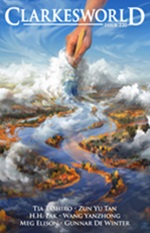 Clarkesworld #220, January 2025
Clarkesworld #220, January 2025
“When There Are Two of You: A Documentary” by Zun Yu Tan
“Never Eaten Vegetables” by H. H. Pak
“Beyond Everything” by Wang Yanzhong
“Child of the Mountain” by Gunnar De Winter
“The Temporary Murder of Thomas Monroe” by Tia Tashiro
“Autonomy” by Meg Elison
Reviewed by Victoria Silverwolf
This issue provides an even balance between short stories and novelettes, containing a trio of each.
“When There Are Two of You: A Documentary” by Zun Yu Tan takes place at a future time when duplicates of a person’s mind can be created. The text consists of interviews with two characters. One is a robot that has been given the duplicated consciousness of a film director. The other is a woman who has her duplicated mind inside her own brain, using it to deal with daily tasks.
The story is fairly short, and doesn’t delve fully into an intriguing premise. (The fact that there are two separate plots adds to this problem.) As the title implies, the use of interviews, as well as news bulletins and transcripts of online discussions, gives the work a sense of realism. Unfortunately, it also has a distancing effect, lessening the story’s impact.
The novelette “Never Eaten Vegetables” by H. H. Pak jumps back and forth in time. Part of the text deals with an artificial intelligence that is in charge of a starship carrying thousands of zygotes, intended to populate a colony world. The other part depicts the colonists as young adults. During the voyage, the AI decided to sacrifice some of the zygotes in order to save the lives of those whose development accidentally started too early. Years later, one of the colonists has to deal with the resulting underpopulation of her planet, as well as the fate of the AI.
The woman is pregnant, which seems intended to parallel the experience of the AI, who is the real protagonist. The latter is a more interesting character than any of the people. (There are also other AIs present as minor characters, and these outshine the humans as well.) The AI is on trial for its actions, and the conclusion of the story turns into a courtroom drama of sorts. This part of the plot depends on technical details, and is thus something of an anticlimax.
“Beyond Everything” by Wang Yanzhong is an award-winning novelette translated from Chinese by Stella Jiayue Zhu. In a future Earth devastated by war, gates linking the planet to alien worlds appear. The few humans to use them have not returned, except for one who is in a mental hospital. The main character undertakes a series of journeys through the gates in an attempt to save Earth by making use of alien wisdom.
The author demonstrates extraordinary imagination and a sense of the strangeness of the cosmos that create a true sense of wonder. The story’s philosophical mood, which is almost mystical, reminds me of some of the works of Arthur C. Clarke. Somehow the story manages to be simultaneously despairing and hopeful, with an awe-inspiring vision of the vastness of time and space.
The title protagonist of “Child of the Mountain” by Gunnar De Winter was created by the sisters of a religious order through the use of biotechnology. She, in turn, returns them to life after they die. The situation changes when she develops a plan of her own.
The speculative technology that appears in the story is unusual and rather gruesome. There are no likable characters, giving the work a very dark and cynical mood. (Appropriately, vultures, both natural and those enhanced to be used as drones, appear frequently in the text.)
The novelette “The Temporary Murder of Thomas Monroe” by Tia Tashiro begins with the killing of the title character, part of an elaborate robbery scheme. Fortunately, he happens to be a member of a family wealthy enough to afford the technology needed to restore him to life. His memory of the crime returns only slowly and erratically. Flashbacks reveal exactly what happened.
Cleverly plotted, this crime story has something of the tricky twists and turns of suspense films like D. O. A. and Memento. One major revelation took me by surprise. It also features fully developed and realistically flawed characters.
“Autonomy” by Meg Elison takes place in a near future of self-driving cars. Women riding alone who are sexually assaulted by men stopping their vehicles can make use of a semi-secret computer program that allows them to turn the tables on their attackers.
Hints early in the story, particularly the name of the program, allow the reader to predict what will happen to one such criminal. The speculative content is not strictly necessary to the plot, given a woman in the modern world willing to protect herself by any means possible.
Victoria Silverwolf has seen D. O. A. and Memento.